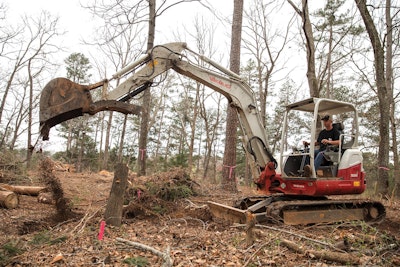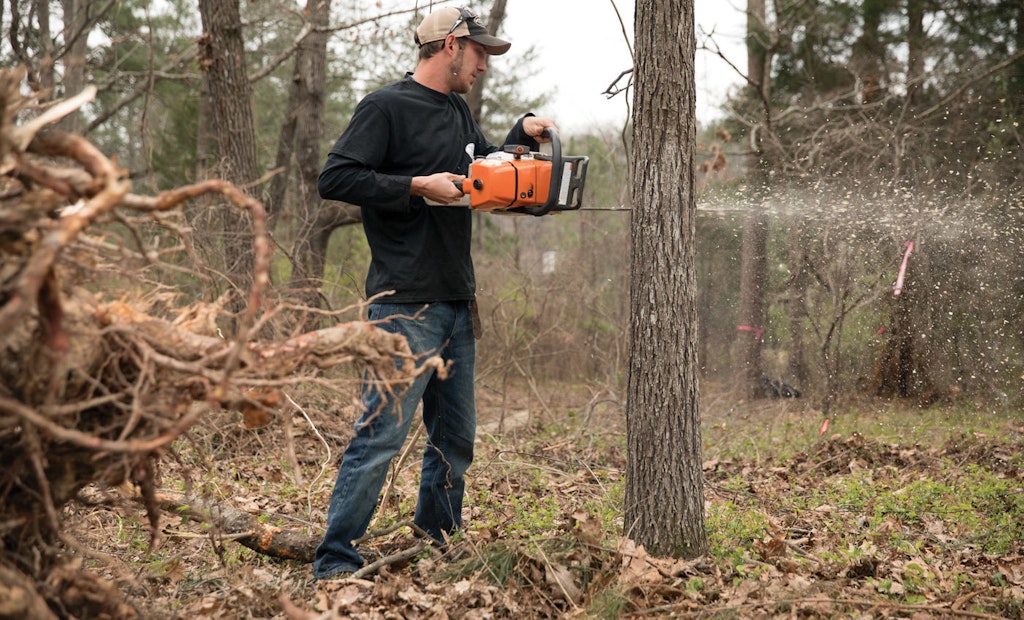Taking the fear out of a customer’s septic project evolved into a robust business for Josh Wood, but the development came recently for the Buford, Georgia, resident.
Wood, 40, spent years traveling the southeastern states as a pipe layer and heavy construction worker. In 2003, he became a first-time father. “My daughter was a game-changer,” Wood says. “Every weekend, I’d drive from where I was to see her. By 5 years old, she was calling during the week, begging me to come home.”
Wood finally came home and opened Septic & Sewer Solutions in May 2013, the year his second daughter was born. He had learned the septic business and many life lessons from mentor and uncle, Billy Hinson. Few were easy, Wood discovered, but none were as difficult as those he faced during the year that almost broke him.
THE YOUNG GUN
Wood grew up playing on equipment in his father Eddie Wood’s shop yard and napping under his mother’s desk in one of five construction offices. By age 19, he was a supervisor for CKR Earthworks, a subcontractor for ARCO Construction, Beers Construction, and Cy-Con.
“The men snickered at my youth, but I was designing jobs, changing work orders, dealing with groundwater, laying pipe, and moving dirt,” Wood says. “I also received a percentage from the projects I completed ahead of schedule. For a kid, I was doing very well.” The work also gave him an understanding of where to find what soil type in Gwinnett County.
As work dried up in 2008, Wood returned home from rehabilitating sewers. He joined brother Charles Wood’s pipeline construction business, while pondering his next move. “I didn’t want to devote my life to growing a business from two front-end loaders to more than 300 pieces of equipment like Uncle Tony (Wood),” Wood says. “Uncle Billy, on the other hand, wasn’t stressed, spent time with his four kids, chose the jobs he wanted, and always did well regardless of the economy. I liked his lifestyle.”
Josh Wood opened his septic business with a shovel and a paid-for 2004 International 8600 built out by Beverage Body and Trailer with 2,500-gallon steel tank and Masport XHL400 pump.
Hinson, then 71, gave Wood his unwanted septic work. After several months of shoveling to expose tanks, Wood paid for a Takeuchi TB135 mini-excavator.
Wood followed Uncle Tony’s example and left job sites polished and shined. He adopted Uncle Billy’s obsession with perfection and did the same thing the same way every time. He also integrated the uncles’ philosophy of customer satisfaction being more important than anything else.
TOUGH-JOB REPUTATION
“The worst thing that happened to Georgia was regulators mandating serial distribution for sites with slopes 5 percent and greater,” Wood says. “It’s a double whammy for systems because the code requires two-compartment septic tanks that remove oxygen meant for the drainfield. Combine that with overloading the first lateral and the field fails every time and always prematurely.”
For peace of mind, Wood installed equal (parallel) distribution systems, poured concrete pads under distribution boxes, and brought tanks to grade with TUF-TITE risers. People noticed.
Wood’s first big break in 2013 arrived when brother Charles Wood referred an Atlanta attorney needing a septic-to-sewer conversion at his office. Days after Josh Wood completed the job, the attorney’s residential onsite system in the Country Club of Roswell failed. “The community is notorious for difficult septic installs,” Wood says. Other contractors walked away, but Wood was hungry, and thus began his reputation as the customer’s last resort.
The community abuts the Chattahoochee River, hills run almost vertically, and mature trees grow on thin topsoil over granite ledge. A friend with a tree service helped clear half an acre for the replacement septic. “I did it, but it was tough turning this job into a showpiece using the TB135,” Wood says.
The attorney’s wife loved what he had accomplished and, as president of the homeowners’ association, mailed a bulletin to residents about his company. “Two weeks later, a neighbor called with the same problem, and we became busier,” Wood says. “I rented equipment as needed, and it helped me establish a realistic budget.”
Kevin Burke joined Wood in November 2013. The two had laid pipe together for 13 years and knew how to work together. “We rolled along through 2014 lean, mean and exhausted,” says Wood, who did paperwork each evening. “It was chaos, but things were looking good.”
All that changed on Christmas Day 2014 when his house burned down. The New Year brought the near death of his father and sister, and his brother’s diagnosis with cancer. “So many personal things were happening that the chaos made it hard to focus on running the business,” Wood says. He did some jobs with his uncles, earning enough to survive. Toward the end of 2015, he considered selling out.
AERIAL SEWER SOLUTION
Then an important onsite challenge came through. For years, Billy had been working on a septic-sewer conversion to replace the failed onsite system at the American Legion in Duluth, Georgia. The property had a creek, bad soils, major restrictions and a lot of ledge rising to grade.
Wood’s pipe-laying experience told him the solution was an aerial sewer crossing.
“Blasting under the creek and through the rock would be expensive, and the shock waves could damage the building’s foundation,” he says. When Wood submitted the plans to Gwinnett County officials for approval, it was the third such design in the state. Components included a 1,500-gallon grease trap, 2,000-gallon septic tank, lift station with 1 hp pump (Goulds Water Technology, a Xylem brand), aerial sewer and composite manhole connected to the county sewer.
“We sunk pillars in the creek and ran the 4-inch PVC pipe across them,” Wood says. “The line goes back underground at the rear of the property.” But there was a kicker. Once force mains were installed, the county was responsible for the concrete manholes. To reduce their maintenance costs due to hydrogen sulfide corrosion, county regulations mandated polypropylene or fiberglass manholes.
“Composite structures cost $1,800 per vertical foot compared with an average $60 for precast ones,” Wood says. “It’s sticker shock for customers.”
NEW MARKETING
While at the American Legion, Wood met Tara Heinze, an office administrator who offered to help promote his business and set the company up on the HomeAdvisor website. Wood spent the money from the American Legion job and sale of the TB135 on a Takeuchi TB260 tracked 6-ton compact excavator, a TB216 tracked mini-excavator, and a TL8 tracked compact track loader.
Wood and Heinze focused the company on pumping and charging established flat rates. Wood used signed work orders and showed customers his tipping receipts to verify expenses. “When people told my story on HomeAdvisor, pumping took off like wildfire,” Wood says. In 2017, they pumped 420,000 gallons.
Wood began his HomeAdvisor installer reputation by setting septic tanks on six 1-acre lots with vertical hills and only 12 inches between setbacks. What followed was every technician’s worst septic nightmare. Wood responded to a HomeAdvisor lead, only to find a landscaped yard with rocks protruding 10 feet above grade and the septic tank compartments full of sand from infiltration.
“The homeowner had bought the mansion sight unseen and got snookered,” Wood says. “The onsite system was on a massive granite ledge.” A makeshift lift station at the foundation footer pumped wastewater to the septic tank. State code, however, specified gravity-flow to the tank, then dose to the drainfield. The entire area was saturated with wastewater, and the only suitable soil was 270 feet away.
Wood rented a Kobelco SK330 excavator with 11,000-pound hammer, then cut a 120-foot-long trench through 9 feet of ledge for the house lateral. Using a wellpoint and the vacuum truck, the crew dewatered 7,500-gallons from the excavations for the two H20-rated waterproof concrete tanks (McDaniel Concrete Products).
“We pounded five days and into the night, bedding in No. 57 stone to fill voids and installing as we went,” Wood says. “We also trenched in 270 feet of supply line feeding 280 feet of Infiltrator chambers.”
By the close of 2017, Wood’s team had installed five new systems and 27 replacements within a 25-mile service radius. Work was split 50-50 between new installations and maintenance/repairs.
KEEP IT GOING
The company’s latest development is providing turnkey site preparation — excavation, grading, clearing, and demolition — for developers. “Frequently, my septic work is held up because so little topsoil remains that graders are scared to touch it,” Wood says. “However, I know how to survey, and I’m very good at grading and erosion control. I can assuage any fears contractors have about their projects.”
His winning team includes pump truck driver, Duane Ballard, and assistant Jerry Heinze, also the in-house tree surgeon and Tara Heinze’s son. Tara Heinze is the company executive administrator, and Wood works with pipe layer and certified electrician Michael Keenan.
“It’s divide and conquer around here,” Wood says. “And just like Uncle Billy, we’re in it for the long haul.”
A winning maintenance program
The state of Georgia’s septic code recommends pumping tanks every three to five years, and companies advertising teaser-priced $159 pumpouts have left homeowners leery of bait-and-switch practices.
To overcome the industry’s sullied reputation and reassure customers, Josh Wood, owner of Septic & Sewer Solutions, developed his “16.60” maintenance program. “If they hire us to bring their tanks up to code, we will guarantee our repairs for three years,” Wood says. “That includes the house lateral, septic tank, and 12 inches beyond the tank or to wherever we connected to the drainfield supply line.”
System replacements also receive the three-year guarantee, which includes TUF-TITE riser kits and a locked-in pumping price with warranty. Customers enrolled in the program pay a monthly fee of $16.60 (sewer bills average $30 a month).
“If anything happens to our repairs, we fix them for free, no questions asked, provided homeowners follow best onsite practices,” Wood says. “After three years, we pump and inspect both tank compartments, clean the effluent filter, and renew the contract.”
If the homeowner is planning to sell the property, Wood will stress-test the drainfield and write an inspection letter on the spot for most types of systems.
To prevent competitors from usurping and corrupting the company’s “16.60” brand name, Tara Heinz, executive administrator, has applied for a patent and trademark. The patent is pending.










